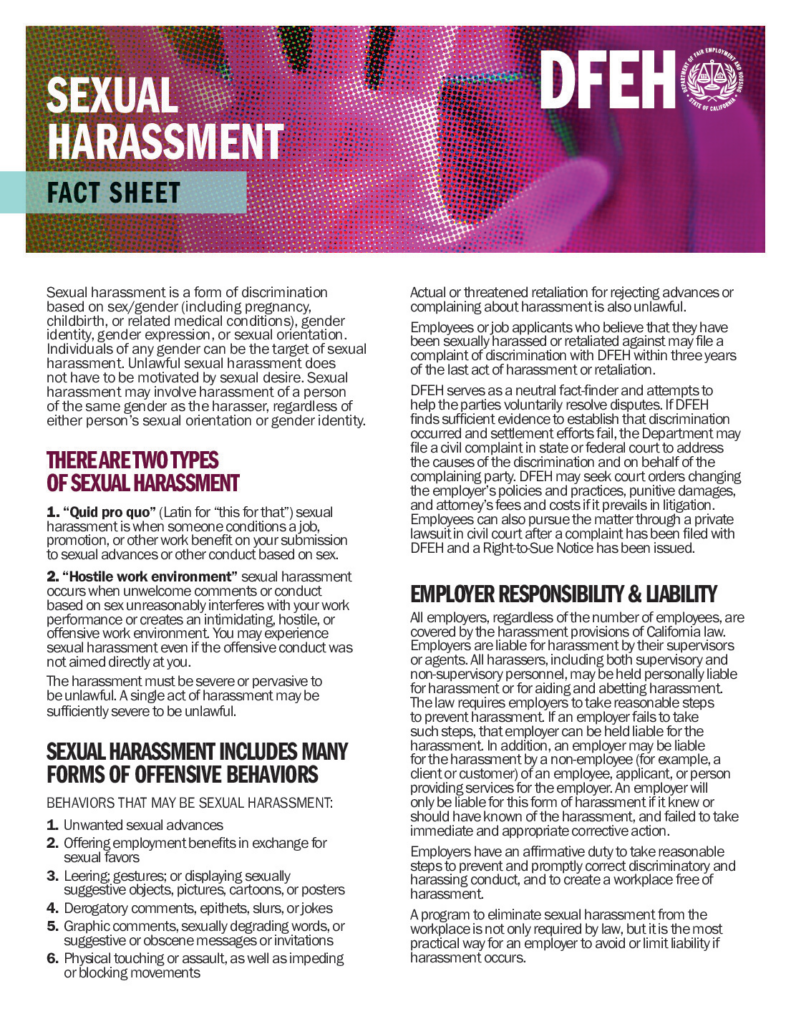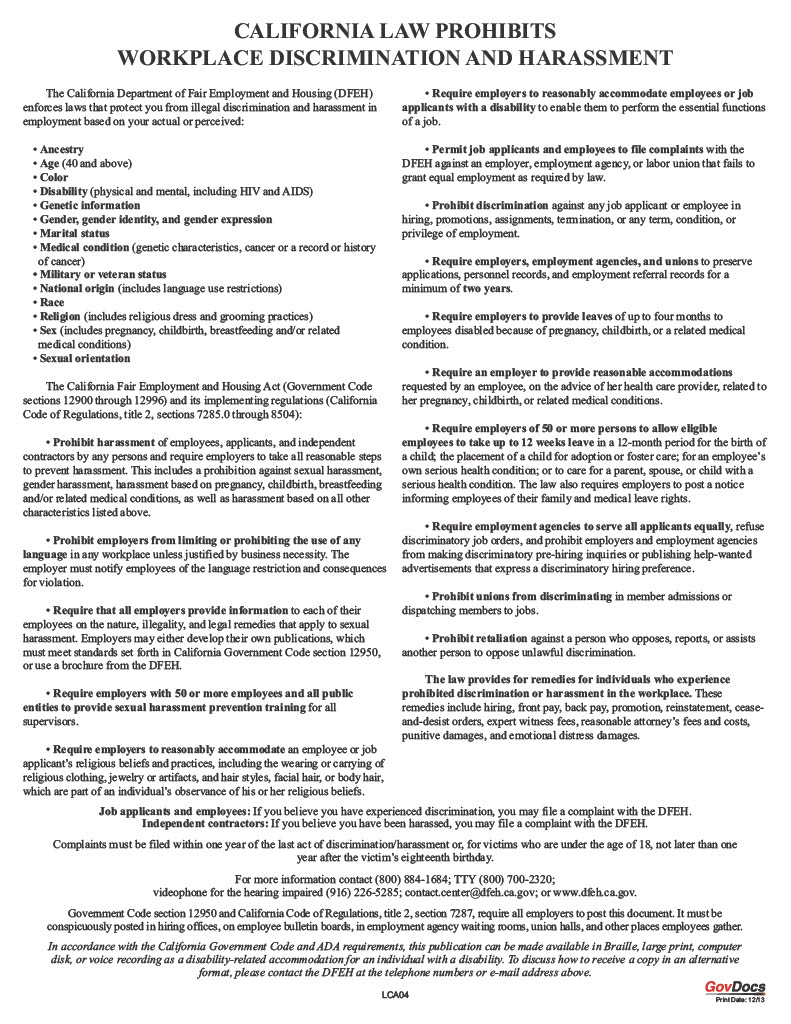
Retaliation occurs when an employer or superior punishes an employee for engaging in a legally protected act. These protected acts can range from reporting a safety code violation, reporting fraudulent activity, taking leave to care for a family member, or even reporting harassment or discrimination. Retaliatory behavior can take many forms including firing, salary reduction, reduced hours, a new job, reassignment, demotion or any other negative action.
Workplace retaliation occurs when an employer takes an adverse employment action against an employee for engaging in legally protected behavior. There are many different bases for retaliation.
In California, workplace retaliation refers to employers making employees suffer a negative employment action for taking part in a protected activity. Negative employment actions can take several forms, including full termination from employment. If this were to happen, the affected employee may have grounds to sue for wrongful termination.
Workplace retaliation could also involve an employer setting up an intolerable workplace environment, giving the employee no choice but to resign. If this were to happen, the employee may have grounds to sue the former employer for constructive termination. Negative employment treatment can also take the form of:
Employees must experience negative employment treatment because of their engagement in a protected activity for the case to be considered workplace retaliation. Employees can experience retaliation at any point, even two weeks after the employee quits or completes their exit interview.
Workers are also protected from retaliation for exercising certain legally guaranteed worker rights. Employers are not permitted to retaliate against California employees for:
Workplace retaliation can take many different forms. Any of the following conduct could constitute unlawful retaliation:
Retaliation and constructive discharge have many features that can hurt departing employees' career moves, but with a strong legal team, employees may obtain certain remedies available to them under employment laws in California.
In California, constructive termination (aka constructive discharge) refers to employers intentionally creating or allowing workplace conditions or circumstances to be so intolerable that employees are left with no choice but to resign. California wrongful constructive termination cases are based on any exceptions to at-will employment.
In general, the term "constructive discharge" is when a worker's resignation or retirement may be found not to be voluntary because the employer has created a hostile or intolerable work environment or has applied other forms of pressure or coercion which forced the employee to quit or resign.
It only takes one incident in the workplace to create a snowball effect that can result in retaliation and wrongful termination. The one incident that many employees experience is sexual harassment – however, it doesn’t stop there. In many cases, employees who filed a workplace sexual harassment claim face retaliation or even wrongful termination.
It is not uncommon for an individual to resign after an uncomfortable conflict or investigation. In some cases, this result is for the better for both the individual and the company. However, employers and managers need to ensure that they did not deviate from normal practices in order to urge the employee to resign.
When courts conclude that the employer was trying to get the worker to quit, or made working conditions intolerable, then they declare a “constructive discharge,” and allow the victim full remedies after quitting.

In order to successfully sue an employer for wrongful constructive termination in California, an employee must demonstrate they had intolerable working conditions and underwent “wrongful” discharge without legitimate reason.
To prove a retaliation claim in California, an employee must show that (1) he has engaged in a "protected activity" - i.e. complaining about unlawful discrimination, unlawful workplace harassment, safety violations, patient safety at a healthcare facility, or exercising a number of other protected rights under the law, (2) he suffered a tangible adverse employment action, such as demotion or termination, and (3) the reason or the main reason for being demoted or terminated is that protected activity. In other words, he was terminated "because" of the protected activity, and not for some other personal, non-retaliatory reasons, however unfair or hurtful it might be.

To prove that an employer retaliated against an employee after the employee complains or files a report of harassment, you must gather evidence of your employer’s conduct and calculate the damages you suffered due to this conduct. An employee who has complained cannot be terminated for violating company policy as long as it is unrelated to the topic of the complaint.
All three of these elements must be proven. Proving causation is often the most difficult part of a retaliation claim. The causal connection between the protected activity and the negative employment action depends on the law that is being invoked.
There is rarely any evidence that directly shows that a former employer acted out of retaliation. Instead, employees usually have to rely on circumstantial evidence that ties the protected activity to the adverse action in the workplace. This often includes:
Post-resignation harassment isn’t a subject that many sources cover because it’s not as common as age, gender, religion, race-related, and sexual harassment. It also isn’t as prevalent as the retaliation that occurs when workers report harassment and discrimination (constructive discharge).
As such, it often exists underneath the radar and manifests as odd “coincidences,” behavioral changes, and interference. Some former workers even have to deal with harassment and interference long after separating from their employer
Employer retaliation victims should retain a skilled employment lawyer from Freeburg & Granieri, APC, Law Firm to ensure that their claim is successful. Our law firm has vast experience in doing workplace investigations and recovering damages such as:
Unfortunately, the statute of limitations for bringing your claim forward can be as short as 180 days, so take action now.
If employer retaliation threatens your livelihood, it's crucial to consult with an attorney to explore your legal options. An employment attorney at Freeburg & Granieri, APC, serving Pasadena, can help establish an attorney-client relationship, safeguard your confidential information, evaluate your claims, and determine if your case may qualify for a wrongful termination or workplace discrimination lawsuit.
If you have further questions about employer retaliation after resignation in California, contact Freeburg & Granieri, APC for a free consultation with one of our experienced employment attorneys today!
Our clients become friends, confidants, and repeat customers. Former clients are our best referral source.
Do not be a commodity, find an attorney who treats your legal issue with the care it deserves.

